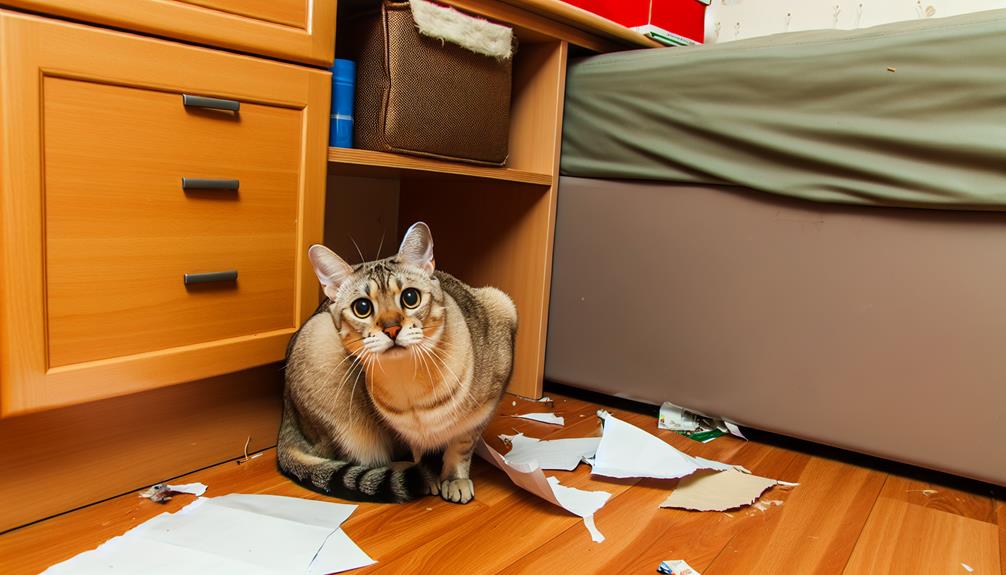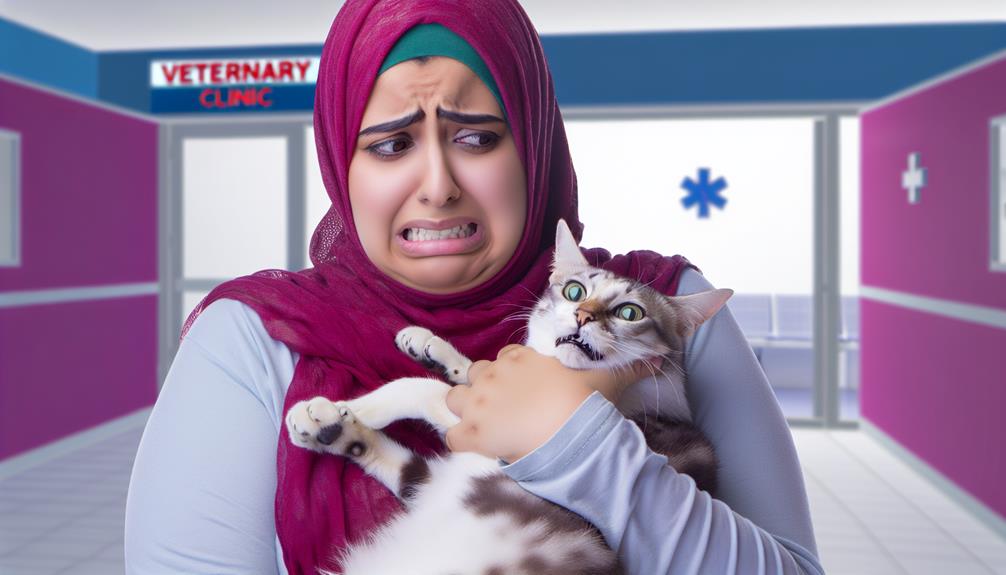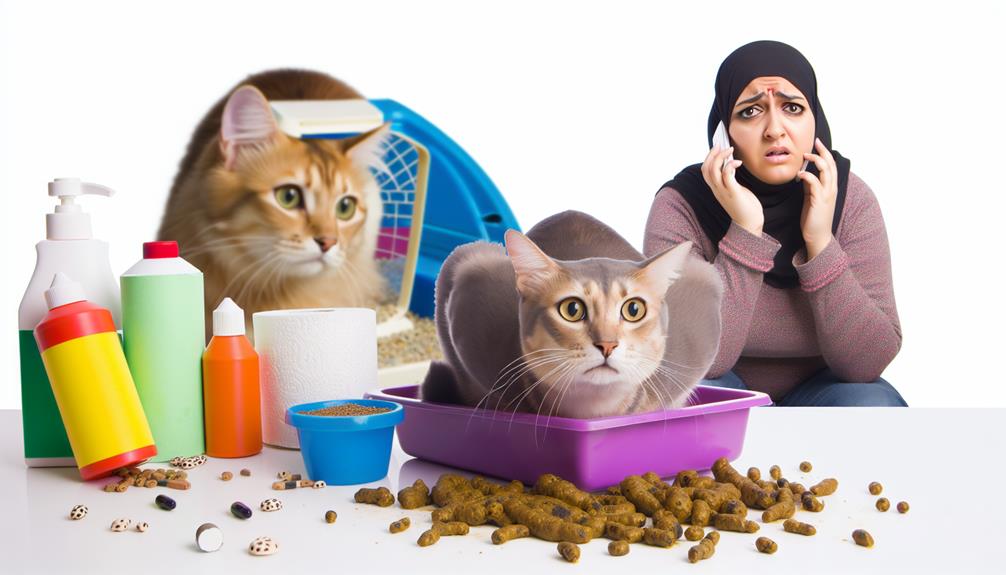When your cat has diarrhea, it can be concerning and messy, prompting questions about the underlying causes. You might be wondering if their diet is to blame, perhaps due to a sudden change or food intolerance. Alternatively, infections and parasites could be lurking in their system, causing gastrointestinal distress. Stress and anxiety, maybe from recent environmental changes, could also trigger these symptoms. Medications and exposure to toxic plants are other potential culprits. So, what's the best way to pinpoint the issue and find a solution? Let's explore these factors and see when it's time to contact your veterinarian.
Dietary Causes
Dietary causes are often a primary factor when it comes to cat diarrhea. If your cat's experiencing this issue, it's vital to examine what they're eating. Food intolerance is a common culprit. Unlike food allergies, which involve an immune response, food intolerance occurs when your cat's digestive system can't properly process certain ingredients. Common intolerances include dairy, certain proteins, and additives like artificial colors or preservatives. If you suspect food intolerance, identifying and eliminating the offending ingredient from your cat's diet is important.
A sudden diet change can also lead to diarrhea. Cats have sensitive digestive systems that don't adapt well to abrupt shifts in their diet. Switching food types or brands without a gradual change can disrupt your cat's gut flora, leading to gastrointestinal distress. It's recommended to make dietary changes slowly, over a period of 7-10 days, mixing increasing amounts of the new food with the old to allow your cat's digestive system to adjust.
Additionally, portion control and feeding frequency are significant. Overfeeding or irregular feeding schedules can result in diarrhea. Maintaining a consistent feeding routine helps stabilize your cat's digestion.
To mitigate these dietary issues, it's advisable to consult with a veterinarian for a tailored feeding plan. They can guide you on the appropriate diet, specific to your cat's needs, ensuring that any food intolerances are addressed and that changes to their diet are managed gradually. Proper dietary management is key in preventing and resolving cat diarrhea related to food causes.
Infections and Parasites
Infections and parasites are another significant cause of diarrhea in cats. These issues can wreak havoc on your cat's gastrointestinal system, leading to discomfort and frequent loose stools. Bacterial infections, such as those caused by Salmonella or E. coli, are common culprits. These bacteria can be ingested through contaminated food, water, or contact with infected animals. Once inside the body, they multiply rapidly, causing severe inflammation in the intestines.
Intestinal parasites are another major concern. These unwelcome guests can range from microscopic protozoans like Giardia to larger worms such as roundworms and hookworms. These parasites attach to the lining of your cat's intestines, siphoning off nutrients and causing damage that leads to diarrhea. If left untreated, infections and parasites can lead to more severe health issues, including dehydration and malnutrition.
Here are some common signs that your cat may be suffering from infections or intestinal parasites:
- Frequent loose stools: One of the most obvious indicators.
- Vomiting: Often accompanies diarrhea when infections are present.
- Weight loss: Despite a normal or increased appetite.
- Lethargy: A noticeable drop in energy levels.
- Visible worms in stool: Sometimes, you might spot worms directly in your cat's feces.
If you suspect that your cat has diarrhea due to bacterial infections or intestinal parasites, it's essential to consult your veterinarian. They can perform diagnostic tests to identify the specific cause and prescribe appropriate treatments. Early intervention can prevent complications and guarantee your cat returns to a healthy, comfortable state.
Stress and Anxiety

While infections and parasites often cause diarrhea in cats, stress and anxiety are also important contributors. Cats are creatures of habit, and any disruption to their routine can result in gastrointestinal distress. Environmental changes, such as moving to a new home, introducing new pets, or even rearranging furniture, can trigger stress responses in your feline companion. These stress responses can manifest as diarrhea due to the cat's heightened state of anxiety.
Behavioral triggers play a vital role as well. Loud noises, unfamiliar visitors, or a lack of hiding spaces can make your cat feel insecure. When a cat perceives a threat, its body responds by releasing stress hormones like cortisol. Elevated cortisol levels can disrupt the digestive system, leading to symptoms like diarrhea. Additionally, cats that have experienced past trauma may be more prone to anxiety-induced gastrointestinal issues.
Monitoring your cat's behavior can help you identify stress-related triggers. Look for signs such as excessive grooming, hiding, or changes in eating habits. Addressing these behavioral triggers is essential for alleviating stress. Providing a safe and secure environment can greatly mitigate anxiety. This includes ensuring access to quiet, secluded areas where your cat can retreat when feeling overwhelmed.
Minimizing environmental changes is another effective strategy. Gradual introductions to new pets or changes in the household can help reduce your cat's stress levels. Using calming aids like pheromone diffusers or engaging in interactive play can also be beneficial.
Medications and Toxins
When it comes to your cat's health, being aware of the potential side effects of medications and the dangers of toxins is vital. Certain medications can cause gastrointestinal upset, leading to symptoms like diarrhea. It's important to monitor your cat closely when they start a new medication and report any adverse reactions to your veterinarian promptly.
Common medication side effects that can lead to diarrhea include:
- Antibiotics: While effective in treating infections, antibiotics can disrupt the natural gut flora, leading to diarrhea.
- Nonsteroidal Anti-inflammatory Drugs (NSAIDs): Used to manage pain, these can irritate the gastrointestinal tract.
- Steroids: Long-term use can lead to gastrointestinal issues, including diarrhea.
- Dewormers: Effective against parasites, but can sometimes cause temporary digestive upset.
- Chemotherapy drugs: While necessary for treating cancer, these can have significant gastrointestinal side effects.
In addition to medication side effects, your cat could also be exposed to various toxins that can cause diarrhea. Many household plants are toxic to cats and can lead to severe gastrointestinal distress. It's imperative to identify and remove any toxic plants from your home.
Common toxic plants include:
- Lilies
- Aloe Vera
- Poinsettias
- Sago Palms
- Philodendrons
Preventive measures, such as keeping your living space free of toxic plants and consulting your vet before administering any medication, can safeguard your feline friend from these potential hazards. Always read medication labels and follow your vet's instructions to minimize risks. Being proactive about your cat's exposure to medications and toxins can help maintain their digestive health and overall well-being.
When to See a Vet

Recognizing the right time to consult a veterinarian is vital for your cat's health. Diarrhea in cats can range from a minor inconvenience to a symptom of a more severe underlying issue. Knowing when to seek veterinary care will help guarantee your feline friend receives the appropriate treatment.
If your cat's diarrhea persists for more than 24-48 hours, it's important to consult a vet. Chronic conditions, such as inflammatory bowel disease or hyperthyroidism, can cause prolonged diarrhea and require professional diagnosis and treatment. Additionally, if your cat exhibits other symptoms like lethargy, vomiting, or a decrease in appetite, immediate veterinary attention is warranted.
Age factors also play a significant role in determining when to seek veterinary care. Kittens and senior cats are more vulnerable to the adverse effects of diarrhea. Kittens, with their developing immune systems, can quickly become dehydrated, while older cats may have underlying health issues exacerbated by diarrhea. In both cases, prompt veterinary intervention is necessary to prevent serious complications.
Moreover, if you notice blood in your cat's stool or if the diarrhea is black and tarry, these could be signs of gastrointestinal bleeding. Such symptoms indicate the need for urgent veterinary evaluation. Similarly, if your cat has a history of chronic conditions, even a single episode of diarrhea should not be ignored.
Conclusion
In addressing your cat's diarrhea, it's essential to take into account dietary changes, infections, stress, medications, and toxins. Have you identified any recent changes in these areas? Pinpointing the cause will help you implement the right treatment and avoid further complications. If symptoms persist or worsen, it's important to consult your veterinarian for a thorough examination. Your vigilance can guarantee your cat's swift recovery and ongoing well-being.
